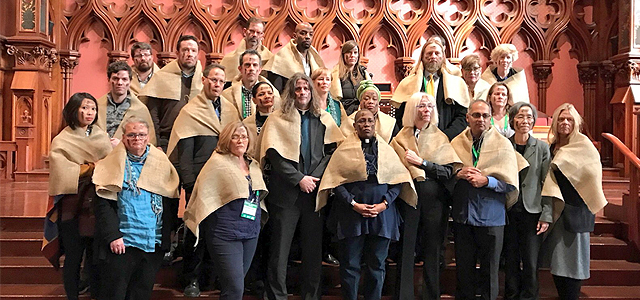A statement originally signed by 300 theologians has called for Christians to be act on climate change, counter the mistreatment of refugees, and work to end gendered violence. The Boston Declaration was signed by academics attending the American Academy of Religion and the Society of Biblical Literature.
Many of the signatories launched the Boston Declaration during a press conference held on 20 November. Appearing in sackcloth and ashes, they called on US Evangelical Christians to repent the sins of racism, homophobia, and xenophobia. Reverend Dr David Wilhite said that US Evangelicalism had become “White male Christianity and for this we should repent.”
“We declare that following Jesus today means fighting poverty, economic exploitation, racism, sexism, and all forms of oppression from the deepest wells of our faith,” the declaration reads.
Citing Mark 12:31’s call on Christians to “Love your neighbour as yourself”, the statement goes on to confess “racism as the United States’ original sin.”
The names who signed the declaration include Cornel West, Shane Claiborne, William Barber, Jonathan Wilson-Hartgrove, Grace Ji Sun Kim, Lisa Sharon Harper, Traci Blackmon, Amos Yong, and Noel Castellanos, among others.
The statement is modeled after the Barmen Declaration, a statement co-authored by Karl Barth during Germany’s Nazi regime.
Australian Theologian Signs
Pilgrim Theological College lecturer The Reverend Dr John Flett was one Australian who signed.
Dr Flett told Insights that he was “more than happy” adding his name to the statement “and especially so in this current political climate.”
“More often than not, the contemporary public discourse concerning Christian theology draws on soundbites from the more conservative (even fundamentalist) wings of the church,” he said.
“Certain definitions of sin, for example, frame debates concerning moral norms and supposed deviation from them.”
“These are simply not the only faithfully theological way to talk about such things.”
“In this current climate it is necessary to name these theologies and the systemic violence they often support, to counter the hateful speech and conduct we are seeing manifest, and to demonstrate a positive theological alternative.”
Declaration Relevant To Australia
While the statement is primarily a US document, Dr Flett said it has plenty of relevance to the Australian context.
“Present within Australian society is the same gender violence and misogyny, the same ecological violations, the same damaging economic policies, the same Islamophobia, the same violence against LGBTQ community, and the same (and on occasion worst) anti-immigration rhetoric and practices,” he said.
While the Boston Declaration has attracted a good deal of coverage, it has also been criticised for its wording.
Wake Forest University Master of Divinity student Steve Gardiner wrote on his blog that, while he agreed with much of the declaration, it was not the right way to reach Evangelical Christians.
“There is a tremendous amount in the declaration with which most, maybe the vast majority of, evangelical Christians—conservative or liberal, Republican or Democrat—would agree,” he wrote.
“But the declaration reads more like a rallying cry for those who already agree with the signers than an appeal to those they are trying to persuade.”
Dr. Flett told Insights that, while he would have liked to have seen more of an emphasis on the rights of first nations’ peoples in the declaration, it “…is ultimately a positive one.”
“It calls the Christian community to an embodiment of the faith which counters all of these aforementioned ills with a vision of the gospel in which embraces all.”
Jonathan Foye is Insights’ editor














